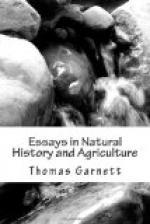I cannot conclude without calling the attention of all interested, and who are able to render assistance in remedying the evil, to the great falling off in the quantity of fish there is in all the Salmon rivers in England. With those in Scotland and Ireland I am not acquainted, but believe that matters are not in a much better state there. I believe that the unsatisfactory state of the laws has a great deal to do with this decline in the value of the fisheries, and I also believe that it is quite possible so to alter the law as to very greatly improve them, and that without improperly interfering with what is of far more importance—I mean the manufactories of the country. As the law stands at present the proprietors of the upper parts of rivers have not the slightest interest in the preservation of the fish in the breeding season, for, as they are seldom allowed to see a fish when it is fit for the table, why should they look after the poachers in close time? Why should they be put to much expense and trouble, as well as the risk of the lives of their game-keepers, merely to breed fish for the proprietors of stake nets and estuary fisheries, who don’t spend a farthing in the preservation of the fish when breeding, and yet reap all the benefit? I had occasion, some years ago, to examine the evidence on this subject given before the House of Commons in 1825, and was exceedingly amused at the schemes resorted to to evade the law, moderate and inefficient as was the law at that time. (Since then the law has been altered both in Scotland and Ireland, but I do not know what are the provisions, nor what has been the effect of the new law.) It required that there should be a free passage for the fish (Salmon) through all the traps, nets, weirs, and devices that were used to catch or detain them, from sunset on Saturday night to sunrise on Monday morning. One man said he paid L7,000 a year for his fishery, and should lose one-seventh of his catch. Another said he allowed a free passage on Sundays, but would not permit anybody to go and examine for themselves. A third proved that he allowed the fish a free passage on Sundays, but his neighbours proved that he placed in the gap a crocodile, painted red. And a fourth was convicted of breaking down the stake nets in the estuary of a river—at the same time he had a net stretched entirely across the river above, both day and night. And so with many others, every one striving with all his might to kill the goose that laid the golden eggs.
This is not the way to improve the Salmon fisheries. To do this effectually the upper proprietors must have a strong interest in the preservation of the breeding of fish, and in order to give them this interest they ought to have an ample supply of fish when they are in the best condition; but to give them this supply the law ought to be altered. At present I believe the law does not require a free passage for the fish (at least in English rivers) except from Saturday




